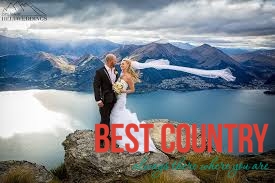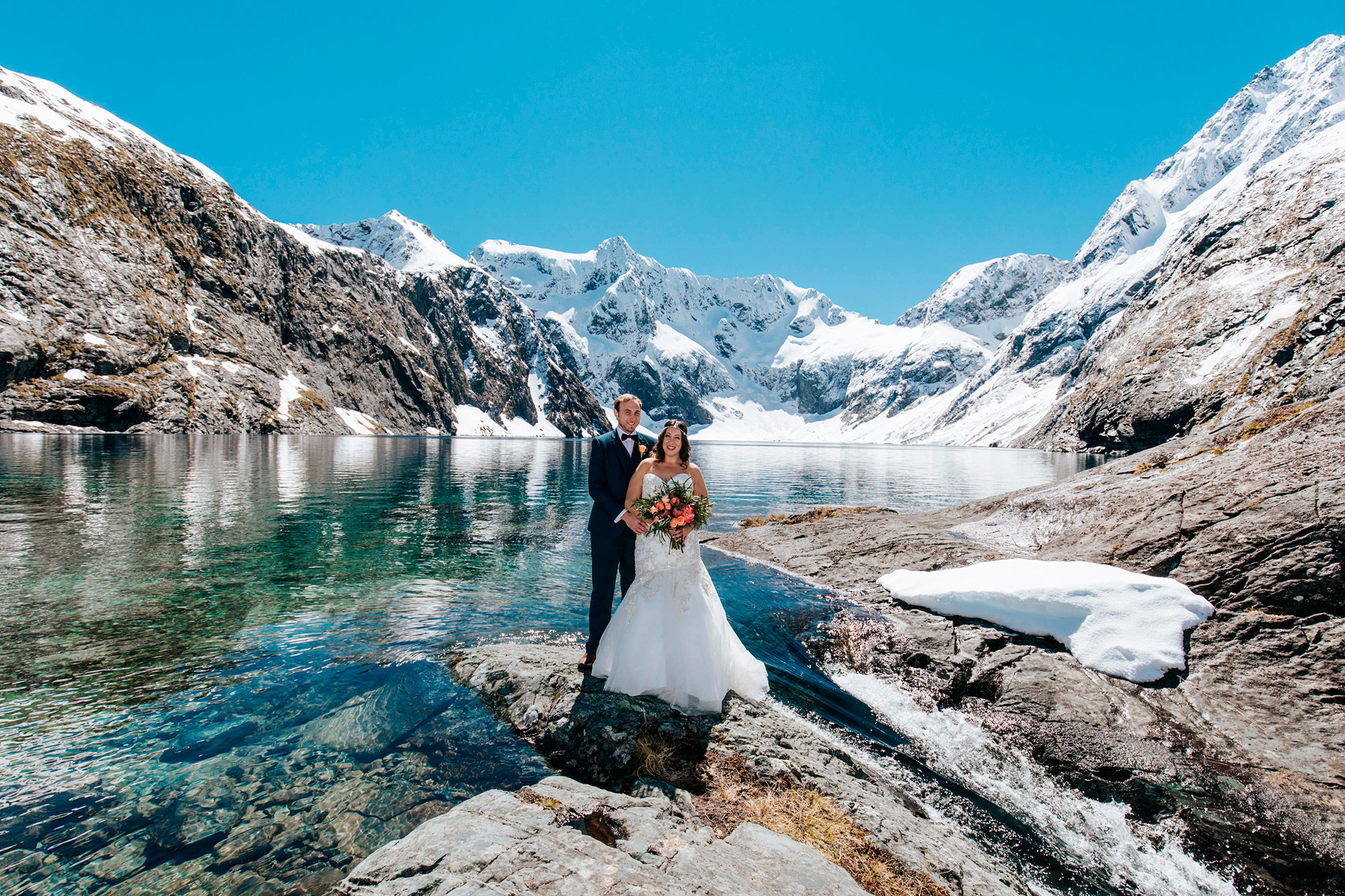Like neighboring Australia, New Zealand is a vast and beautiful country, which enjoys some fabulous rural and coastal landscapes and a culture rich with native as well as borrowed influences.
New Zealand Wedding Traditions
New Zealand Engagements
In modern New Zealand, couples of course meet, fall in love and decide to become engaged of their own free will. However, in some periods of its history, for example back in colonial days, it might have been custom for a suitor to request permission from the father-of-the-bride before popping the question, but this is not a regular custom which has remained.
In New Zealand’s native Maori society, weddings many would customarily have been arranged within and between tribes, although it was also possible for some couples to fall in love and decide to marry – but they would need the blessing of the tribal elders to do so. Many of the ancient Maori tribes were fiercely territorial as land was very important, so it was quite common for a tribe to integrate with a tribe they had defeated, by inter-marrying to establish a stronger tribe and hold onto the land they had gained.
Other beliefs, customs and roles relating to marriage (including who pays for what both before and after the event) have largely followed trends in the West – for example during colonial days, New Zealand’s wedding customs would largely have followed those in British society (and certainly the legal aspects would have been bound by British Common Law).
As such, New Zealand has had periods of time when marriages were organized between families of rank, to help maintain their wealth and status in society, as well as times when it was customary for the father of the bride to pay for everything whilst her mother organized it all! Today, New Zealand is largely a part of most international wedding trends, for example with couples now mostly funding their own weddings.
New Zealand brides had their own version of a bridal shower or the Trousseau Tea of the Canadian-French. In New Zealand, this was known as the Kitchen Tea, where the bride and her female friends and relatives would spend time together working out what her new kitchen needed – then they would supply her with the items.
The custom has largely given way to the more fun element of a full-on hen party, whilst those New Zealand grooms-to-be have always enjoyed stag events prior to their nuptials!
New Zealand Wedding Ceremonies
 Most wedding ceremonies in New Zealand are traditional church weddings, the format of which is mostly a legacy from European and Christian settlers. As such, many couples adhere to the old British superstition of it being unlucky for the groom to see his bride in the run up to the wedding, so the groom usually meets his bride at the church on the day, when she is customarily given away by her father at the wedding.
Most wedding ceremonies in New Zealand are traditional church weddings, the format of which is mostly a legacy from European and Christian settlers. As such, many couples adhere to the old British superstition of it being unlucky for the groom to see his bride in the run up to the wedding, so the groom usually meets his bride at the church on the day, when she is customarily given away by her father at the wedding.
Traditional Maori weddings, delightful ceremonies between couples with a native heritage, may still follow deeply rooted customs and ceremonies. However, to be a legal marriage in New Zealand, the marriage must be performed by a minister of religion, as recognized in New Zealand’s marriage Act of 1908.
Additional legislation, the Maori Purposes Act in 1951 meant that traditional native weddings were less recognized by society and all citizens were required to have that traditional church service in order to be legal and for children to have legitimate status.
So, where one or both of the couple have Maori heritage they might choose to include customary elements into their wedding day, such as by including blessings given in native Maori. The couple might also decide to include the customary Maori-style exchange of rings …we’re not talking bands of gold here, instead ceremonial wedding rings of bone or greenstone are used.
 These represent an important heritage symbol for the Maori people, as well as being symbolic of the marriage, of course. These rings, known as “infinity loops” are carved to absolute circular perfection and, just like that perfect gold band of other cultures, represent the enduring cycle of the couple’s love.
These represent an important heritage symbol for the Maori people, as well as being symbolic of the marriage, of course. These rings, known as “infinity loops” are carved to absolute circular perfection and, just like that perfect gold band of other cultures, represent the enduring cycle of the couple’s love.
Civil wedding ceremonies are also a marriage option for New Zealand couples and these have their own customs dating back to the 19th century when settlers might have had easier access to civil governance than to local churches and ministers.
In such cases, the couple would obtain a licence and, along with two witnesses, attend a ceremony held in a register office or registered building. Nowadays, civil venues are also a popular choice but have taken on a grander status and include some of the magnificent backdrops of the New Zealand cities, landscapes and of course fabulous coastlines!
New Zealand Wedding Partying!
Socialization and partying has always been an essential element of a New Zealand wedding, whether from native Maori origins or from later influences, it’s always been culturally well understood that the party helps both sides of the new family to bond and that getting everyone to relax, eat and drink together will help them to do this, as well as being a chance to pay respects and offer congratulations and blessings to the couple for their day!
- New Zealand weddings are currently (since approximately the start of the 21st century) developing a new tradition of an extra day of celebrations, with the two families getting together on the day after the ceremony too!
- The wedding meal after the ceremony is often still known as the “wedding breakfast” from the British influence of weddings traditionally being held in the morning. Nowadays, most weddings take place later in the day and the parties go on well into the night!
- The couple will usually take to the floor for the customary first dance together, watched by their wedding guests. Again, a modern twist to this is that the couple may arrange something special for this, particularly if they have Maori roots or want to wow their guests in some way!
New Zealand Wedding Clothes
Just like Australia, wedding wear in New Zealand is influenced by the church custom of a white wedding, with the bride customarily wearing a full white wedding gown. Not all grooms stick with the traditional dark suit though – many prefer a gray suit as this is cooler on the day than a black outfit, in that scorching New Zealand sun!
Where one or both of the couple have Maori heritage, it’s not unusual for them to wear customary white wedding attire for the wedding ceremony and then change into more traditional dress for the reception – although this might well depend on the venue for the wedding. A beach-side wedding for example, could easily see them wearing traditional costume throughout, should they choose.
Unique Traditions
- Right up until 1994, it was required by law that a wedding in New Zealand had to be conducted with the door open, to allow easy access for that “if anybody objects ….” moment! Or maybe the open door was for a quick exit by a red-faced bride or groom, perhaps?
- It’s now quite customary for New Zealand couples to include their own vows and ideas in their wedding rites, although many do stick with the traditional Anglican vows, where the bride promises to “obey and serve.”
- Pacific Island weddings often have their own very distinct traditions and customs too – it’s particularly a large community or family affair where everyone chips in to help for many couples. If you are marrying or attending a wedding on one of the Pacific Islands close to New Zealand, it’s certainly worth checking out the local wedding customs too!